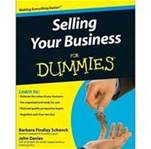Strengthen  Your Business Before Sale
Your Business Before Sale
The stronger your business is before you put it up for sale, the quicker it will sell, and the higher the price it will command. The most obvious attribute you want to present has to do with the financial condition of your business. because almost all buyers will want to see growing sales and positive cash flow that can fun operating and financing costs right from the day of purchase. In order to sell your business, a seller should consider eliminating weaknesses or buyer red flags, cleaning up legal problems, structuring the business finances with the sale objective in mind, and polishing the company’s image prior to sale.
Legal Issues
One of the quickest ways to scare off a buyer is to try to sell a business that is riddled with issues signaling legal troubles ahead. If your business is threatened by a lawsuit or contract disputes or if it has pending legal actions you have not dealt with, you are sitting on a stack of buyer red flags. At that point interest is likely to ebb, price negotiations are likely to intensify and due diligence is likely to become even more intensive.
Your best course of action is to list any possible legal issues before offering your business for sale. Take the necessary steps to clear them or at least get the process of clearing them underway. Addressing legal issues is in the best interest of the seller because in most small business sales the legal liabilities remain with the seller – not the buyer –even after the sale.
Seeking legal advice is recommended if any patents or licenses are part of the business sale. If there is a building lease, ask is it current, assignable and renewable? If the business is in violation of any zoning regulations or if there are any unapproved regulation variances these should be assessed. Pending litigation or unresolved lawsuits should be disclosed if they are ongoing. Resolving labor or compliance issues, making sure licenses are up-to-date and also deciding if the sale of the business will require third-party consents are important legal issues to resolve prior to sale.
Getting Your Finances In Order
If your business finances are a mess, it is difficult to make anything else about the business look good. Financial health is an essential key to success, without it, you cannot grow your business to its potential and sell for its best price. Businesses that show strong financial condition and growth sell for top dollar. Go through financial records or work with an accountant to check on the assets ownership, taxes, debts owed or debts owed to the business. Make sure there are no liens on equipment or other major assets. Bring all federal state and local tax payments up to date and make sure any debts owed are clear. Collect accounts receivable or unpaid credit sales especially those over 45 days.
Increasing your bottom line
Buyers want to see a business generates enough money after all expenses to fund a good living for its owner. Improving your profit which is the taxable earnings the business shows after subtracting all cost of sales and operating expenses from the business such as owner salary, perks, family member perks and other expenses that are important but not necessary is one way to improve the bottom line. Another way is to improve the seller’s discretionary earnings, which is the amount of money the business generates for the benefit of its owner after adding owner’s salary and benefits, family member salary and benefits and other discretionary expenditures back to the profit line.
Increasing prices is one of the quickest ways to increase the bottom line. A well run business raises prices on a regular but not-too-frequent basis. Usually an increase will align with increases in the overall economy so that customers see the changes as understandably unavoidable. If you have not brought your prices into line, face the situation and deal with the fact that your prices need revising.
Cut costs and reduce overhead. Make sure the cuts are strategic and do not eliminate expenses that are necessary to the strength of the business. Look for those expenses that are not contributing to the business and eliminate them. This could be a large ad in the yellow book or membership to a local networking group that you are no longer involved. Every business situation is different but all benefit from occasional and careful review. Hold off on replenishing supplies or replacing staff unless necessary to the health of the business. Look for items you purchase or services at lower costs and shop around for more affordable prices.
Improve Your Businesses Curb Appeal
Once your business is on the market, prospective screened buyers will start to examine your business. Most buyers these days go straight to the computer to search for information. They will drive by your business, collect marketing materials and form an opinion of your business appeal before every hearing a polished sales pitch from the seller. A business for sale needs to make a good first impression. You want everything from your stationary to ads, brochures, uniforms, and bags, web pages to convey the same logo, color, message, and overall look. Consistency in marketing materials presents a strong brand to a buyer. Essentially selling a business, especially one that has foot traffic is just like selling a home, the curb appeal and first impressions of your location are very important to the outcome. Make sure things are clean and fresh, modern furnishings and some sprucing up can go a long way toward helping sell your business.
** from the book Sell a Business for Dummies by Barbara Findlay Schenck, Business Advisor & Sunbelt’s CEO John Davies




